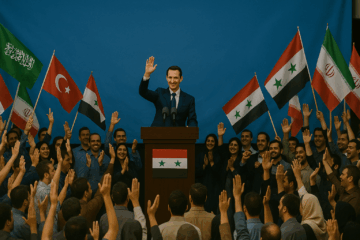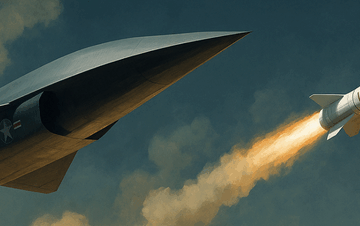At the occasion of the July 2024 Saint Petersburg Marine National Celebration—Russia’s Grand Naval Day Parade—Russian president Vladimir Putin expressed concerns over the US and Germany’s plans to deploy American intermediate-range missile systems on German territory. Putin warned that Russia would no longer be bound by its unilateral moratorium on deploying medium- and short-range strike capabilities.
It might be tempting to dismiss these statements as yet another instance of grandstanding by an aggressor portraying itself as an innocent victim. However, it might be worth putting Putin’s comments into context for some decoding of the next steps required not only for the Ukraine conflict but for the entire European deterrence picture.
The deployment of American intermediate-range missile systems on German territory is scheduled for 2026. When declaring Russia unbound by any unilateral moratorium on deploying medium- and short-range strike capabilities, Putin blamed the United States’ withdrawal from the Intermediate-Range Nuclear Forces Treaty (INF) for Russia’s necessary actions.
Russia plans to produce weapons similar to those prohibited by the INF Treaty, increasing the nuclear component of Russia’s military budget. Overall, Putin presented the US deployment of missiles in Europe as a strategic threat to Russia and a potential justification for Russia’s own nuclear response. Russian invasion of Ukraine and nuclear threats against NATO had nothing to do with it.
During his speech at the Naval Day Parade, Putin raised concerns about Western tolerance for nuclear weapon use and the deployment of missiles in Germany. There was also an aspect of pleasing the crowd at home and impressing on them the irrefutable logic of his leadership. Reminding Putin’s audience of Russia’s military power and strategic importance, particularly regarding the Baltic Sea, was paramount.
Putin often refers to what he characterizes as the period of great tension between the tragically defunct Soviet Union and the West—the Cold War. The Russian narrative once again views the West as an enemy. It is helpful to listen to Putin’s 2007 Munich speech. He advocated for an offensive stance towards the West and revigorated the Russian complex of obsidionalism (under siege mentality), which views the West as a long-term adversary.
When in 2008 Putin invaded Georgia, French president Nicolas Sarkozy barely managed to understand what the invasion meant. The naivete of the West convinced Putin that Crimea was up for grabs. Indeed, not one shot was fired by the West when Putin grabbed Crimea in 2014.
Putin is also well aware of the fact that the current NATO defense math simply does not add up. For example, France used to spend 3 percent of its gross domestic product (GDP) on defense—at the end of the Cold War. France stopped just short of completely gutting its military after 1991 and kept its nuclear weapons in working order. Three decades later, France struggles to spend 2 percent of GDP on defense, though it has now substantially increased defense spending as of late. Most of Europe, except for the voluntarist Baltic and Nordic countries, is in this situation or even worse.
On the one hand, Russia may be trying to extend the Ukraine conflict as a way to justify increased defense spending. On the other hand, extending the Ukraine conflict also postpones Russia’s rearming for a much larger and deeper fight against NATO.
When Putin publicly threatens the use of nuclear weapons, it plays to domestic audience reassurance. Russian naval struggles in the Black Sea are real. The enlargement of NATO to Sweden and Finland only makes matters worse as the Baltic Sea now sees Putin with NATO able to cut off access to the Atlantic and Kaliningrad. After all, the expansion of NATO leaves Russia with NATO forces much closer on land and able to completely cut off Russia by sea in the West. It should come as no surprise then that Putin threatens the use of nuclear weapons. Putin has decided a structural investment in nuclear forces is his best option.
In his protracted conflict with Ukraine, the Ukrainians are provided enough military support to avoid defeat, but not enough to unambiguously prevail over Russia. Finnish President Sauli Väinämö Niinistö made an ouverture to Russia to suggest peace negotiations. Considering economic and military recruitment challenges and struggles on the ground and in the Black Sea, Russia may eventually seek negotiations. However, Putin and Russian leaders may be reluctant to negotiate as it could be perceived as a sign of weakness.
Western diplomacy should look deeper at the strategic and deterrence picture. It is rather challenging to create a consensus within Russia’s political circles regarding Putin’s foreign policies, particularly towards the West. Even the rapprochement and convergence of interests that led to the China-Iran-North Korea-Russia nexus, the “Axis of Upheaval” according to British prime minister Keir Starmer, is not something straightforward. Russia’s concern for China’s ambitions should never be underestimated.
Ukraine, however, is the immediate concern and deterring further NATO intervention is most important. Thus, Putin will continue to threaten in an effort to coerce NATO restraint and the further deterioration of Russia’s position in Europe.
Christophe Bosquillon is a Senior Fellow at the National Institute for Deterrence Studies. He has over 30 years of international experience in general management, foreign direct investment, and private equity and fund management across various industries in Europe and the Pacific Basin. The views expressed in this article are the author’s own.
About the Author

Christophe Bosquillon
Christophe Bosquillon is a Senior Fellow at the National Institute for Deterrence Studies. He has over 30 years of international experience in general management, foreign direct investment, and private equity and fund management across various industries in Europe and the Pacific Basin.





My esteemed colleague Christophe has written another crisply reasoned and very well argued contribution to Global Security Review. His well informed take on views and concerns in France and the rest of Europe are especially valuable additions to global dialogue about best containing and eventually defanging the Gang of Four, the Brothers Mayhem, the Axis of Upheaval, the CRINKs. Bloody Vladimir conveniently forgets that the reason the U.S. withdrew from the INF was that Russia was egregiously cheating and violating the treaty — this now is all truly his own doing! One can (sadly) add to Christophe’s comments re the President of France at the time not getting it when Russia invaded Georgia that then POTUS Obama didn’t get it either when Russia invaded Donbas and annexed Crimea. Such sleepwalking is why the world is in the current security crisis. As to the question of anyone actually prevailing decisively against an adversary — short of them collapsing from internal rot — this might actually not be possible (or advisable to try) when that adversary is nuclear armed and is priming its people and its military and its propaganda apparatus for nuclear conflict. Such is the double edged sword and irony of nuclear deterrence: alleging any threat is “existential” to one’s regime can be the excuse to pop a tactical nuke or two. Only time will tell if broader strategic stability can be restored by the U.S. pursuing a necessarily more symmetric defense policy including nuclear Dynamic Parity.